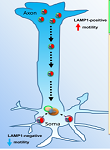|
|
|
Unique Features of Neuronal Autophagy: Considerations for Therapeutic Targeting
|
|
|
|
|
|
|
|
|
|

|
|
|
|
José Antonio Rodríguez-Navarro, and Eloy Bejarano
|
|
|
|
Tufts University, USA and Instituto Ramón y Cajal de Investigaciones Sanitarias, Spain
|
|
Jean Mayer USDA Human Nutrition Research Center on Aging, 711 Washington Street Boston, MA, 02111, USA
Departamento de Investigación, Hospital Ramón y Cajal, Carretera de Colmenar, km 9,100, Madrid, Spain
|
|
eloy.bejarano@tufts.edu
|
|
|
|
|
|
|
|
|
|

|
|
Autophagy is an essential catabolic pathway responsible for the maintenance of organismal homeostasis. Degradation of damaged organelles and proteinaceous aggregates predominantly takes place via autophagy and a proper function of autophagy is vital for cellular surveillance. Given their post-mitotic nature, neurons are particularly vulnerable to stress and, consequently, robust housekeeping systems are required to guarantee the adequate functionality and viability of neurons. A vast literature links defective autophagic function to neurodegenerative diseases and dietary/pharmacological activation of autophagy has been proposed as potential strategy to fight these diseases. Here we summarize the recent progress on the research of neuronal autophagy highlighting the unique features of autophagy in neurons. In the last section, we discuss about therapeutic strategies modulating autophagy to preserve neuronal surveillance during aging.
|
|
|
|
|
|
|
|

|
|